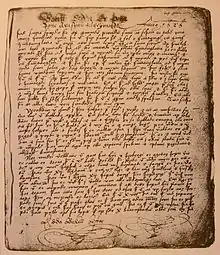prose
English


Etymology
From Middle English prose, from Old French prose, from Latin prōsa (“straightforward”) from the term prōsa ōrātiō (“a straightforward speech – i.e. without the ornaments of verse”).[1][2]
The term prōsa (“straightforward”), a colloquial form of prorsa (“straight forwards”), the feminine form prorsus (“straight forwards”), from Old Latin prōvorsus (“moving straight ahead”), from pro- (“forward”) + vorsus (“turned”), form of vertō (“I turn”).[2] Compare verse.
Pronunciation
- (Received Pronunciation) IPA(key): /ˈpɹəʊz/
- (General American) IPA(key): /ˈpɹoʊz/
Audio (GA) (file) - Rhymes: -əʊz
- Homophone: pros
Noun
prose (usually uncountable, plural proses)
- Language, particularly written language, not intended as poetry.
- Though known mostly for her prose, she also produced a small body of excellent poems.
- 1667, John Milton, Paradise Lost (1st ed):
- ...Or if Sion Hill
Delight thee more, and Siloa's Brook that flow’d
Faft by the Oracle of God; I thence
Invoke thy aid to my adventrous Song,
That with no middle flight intends to soar
Above th’ Ionian Mounts while it pursues
Things unattempted yet in Prose or Rhime...
- Language which evinces little imagination or animation; dull and commonplace discourse.
- 1888, Henry James, Partial Portraits, Macmillan:
- ...the vehicle is plodding prose, but the effect is none the less poignant. And in regard to this I may say that in a hundred places in Trollope the extremity of pathos is reached by the homeliest means.
-
- (Roman Catholicism) A hymn with no regular meter, sometimes introduced into the Mass.
- 1699, A new ecclesiastical history:
- Proses are parts of the Office of the Mass which are sung just before the Gospel, upon great Festivals. The French also call those Rhythmical Hymns Proses, which are sung in their Offices in the Church of Rome, in which Rhime only, and not Quantity of Syllables, is observed.
-
Antonyms
- poetry, verse
Derived terms
- beige prose
- prose poem
- prosewise
- purple prose
Related terms
- prosaic
- prosody
Translations
|
Verb
prose (third-person singular simple present proses, present participle prosing, simple past and past participle prosed)
- To write or repeat in a dull, tedious, or prosy way.
- 1819, John Keats, Otho the Great, Act I, Scene II, verses 189-190
- Pray, do not prose, good Ethelbert, but speak;
- What is your purpose?
- 1896, Robert Smythe Hichens, The Folly of Eustace:
- Already he felt himself near to being a celebrity. He had astonished Eton. That was a good beginning. Papa might prose, knowing, of course, nothing of the poetry of caricature, of the wild joys and the laurels that crown the whimsical. So while Mr. Lane hunted adjectives, and ran sad-sounding and damnatory substantives to earth, Eustace hugged himself, and secretly chuckled over his pilgrim's progress towards the pages of Vanity Fair.
- 1819, John Keats, Otho the Great, Act I, Scene II, verses 189-190
References
- “prose, n.”, in MED Online, Ann Arbor, Mich.: University of Michigan, 2007, retrieved 29 September 2021.
- Douglas Harper (2001–2023), “prose”, in Online Etymology Dictionary.
- prose in Webster’s Revised Unabridged Dictionary, G. & C. Merriam, 1913
Anagrams
- OPers., Peros, Perso-, S'pore, Soper, Spero, opers, pores, poser, preso, reops, repos, ropes, soper, spore
Czech
Pronunciation
- IPA(key): [ˈprosɛ]
- Rhymes: -ɔsɛ
Noun
prose
- locative singular of proso
Verb
prose
- masculine singular present transgressive of prosit
Related terms
- prosíc
- poprosiv
- prosící
French
Etymology
From Latin prōsa.
Pronunciation
- IPA(key): /pʁoz/
Audio (France) (file) Audio (file) - Homophone: proses
Noun
prose f (plural proses)
- prose
Derived terms
- faire de la prose sans le savoir
- prosateur
- proser
Verb
prose
- inflection of proser:
- first/third-person singular present indicative/subjunctive
- second-person singular imperative
Further reading
- “prose”, in Trésor de la langue française informatisé [Digitized Treasury of the French Language], 2012.
Anagrams
- perso, pores, poser, repos
Italian
Noun
prose f
- plural of prosa
Anagrams
- perso, porse, preso, respo, spero, sperò, spore
Lower Sorbian

Etymology
From Proto-Slavic *porsę.
Pronunciation
- IPA(key): /ˈprɔsɛ/, [ˈprɔsə]
Noun
prose n (genitive proseśa, dual proseśi, plural proseta)
- piglet
Declension
| Singular | Dual | Plural | |
|---|---|---|---|
| Nominative | prose | proseśi | proseta |
| Genitive | proseśa | proseśowu | prosetow |
| Dative | proseśeju | proseśoma | prosetam |
| Accusative | prose | proseśi | proseta |
| Instrumental | proseśim | proseśoma | prosetami |
| Locative | proseśu | proseśoma | prosetach |
Further reading
- Muka, Arnošt (1921, 1928), “prose”, in Słownik dolnoserbskeje rěcy a jeje narěcow (in German), St. Petersburg, Prague: ОРЯС РАН, ČAVU; Reprinted Bautzen: Domowina-Verlag, 2008
- Starosta, Manfred (1999), “prose”, in Dolnoserbsko-nimski słownik / Niedersorbisch-deutsches Wörterbuch (in German), Bautzen: Domowina-Verlag